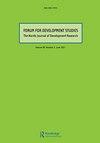不是为了“做出重大决定”而长大的:巴基斯坦农村的年轻人机构和生计
IF 1.1
Q3 DEVELOPMENT STUDIES
引用次数: 3
摘要
摘要:我们研究了巴基斯坦农村农业社区的年轻人对他们做出重要决策的能力以及他们的生计经历的证词。我们的分析以代理理论为指导,这些理论关注的是年轻人识别和执行目标的能力如何通过他们当地的机会结构来调节——塑造他们的家庭关系、生计选择和主流社会规范。我们将比较和上下文定性分析方法应用于我们的12个村庄病例的数据集,其中包括24个特定性别的青年重点群体。我们还提供了二次调查分析。我们发现,近年来,农村年轻男性的就业水平很高,而农村年轻女性的就业率从本已较低的水平下降。年轻的研究参与者主要观察到做出重要决定的能力有限。他们一再将此归因于对长辈的严格尊重,以及对他们的性别、年龄、家庭地位、婚姻状况和社会经济地位的其他规范。他们还报告说,谈判和抵制限制性规范;然而,年轻女性的能动性似乎尤其受到规范的约束,这些规范阻碍了她们的身体流动性和明显的经济角色。我们研究了两个村庄,在那里,一些年轻人表现出比其他人更健康的代理水平和更理想的经济机会,以及在这种环境中亲属关系和流动规范的重要性。我们呼吁建立年轻人代理的模式,更有效地记录家庭关系的重要性、长辈的守门人角色以及规范的上下文和流动性,因为这些动态既约束又促进了年轻人的代理。本文章由计算机程序翻译,如有差异,请以英文原文为准。
Not Raised ‘To Make Big Decisions’: Young People’s Agency and Livelihoods in Rural Pakistan
ABSTRACT We examine young people’s testimonies about their capacity to make important decisions and their livelihood experiences from agricultural communities that span Pakistan’s countryside. Our analysis is guided by theories of agency that focus on how a young person’s capacity to identify and act on goals is mediated by their local opportunity structure – shaping their household relations, livelihood choices, and prevailing social norms. We apply comparative and contextual qualitative analysis methods to our dataset of 12 village cases, which include 24 sex-specific youth focus groups. We also present a secondary survey analysis. We find high rural employment levels among young men in recent years, and a decline in rural young women’s employment from already low levels. The young study participants mainly observe limited capacity to make important decisions. They repeatedly attribute this to expectations of strict deference to elders and other norms about their gender, young age, junior household position, marital status, and socio-economic standing. They also report negotiating and resisting confining norms; however, young women’s agency appears especially constrained by norms that discourage their physical mobility and visible economic roles. We examine two villages where some youth express healthier levels of agency and more desirable economic opportunities than others, and the significance of kinship relations and fluid norms in this environment. We call for models of young people’s agency that register more effectively the importance of household relations, the gatekeeper role of elders, and the contextual and fluid properties of norms, as these dynamics both constrain and enable young people’s agency.
求助全文
通过发布文献求助,成功后即可免费获取论文全文。
去求助
来源期刊

FORUM FOR DEVELOPMENT STUDIES
DEVELOPMENT STUDIES-
CiteScore
1.80
自引率
14.30%
发文量
24
期刊介绍:
Forum for Development Studies was established in 1974, and soon became the leading Norwegian journal for development research. While this position has been consolidated, Forum has gradually become an international journal, with its main constituency in the Nordic countries. The journal is owned by the Norwegian Institute of International Affairs (NUPI) and the Norwegian Association for Development Research. Forum aims to be a platform for development research broadly defined – including the social sciences, economics, history and law. All articles are double-blind peer-reviewed. In order to maintain the journal as a meeting place for different disciplines, we encourage authors to communicate across disciplinary boundaries. Contributions that limit the use of exclusive terminology and frame the questions explored in ways that are accessible to the whole range of the Journal''s readership will be given priority.
 求助内容:
求助内容: 应助结果提醒方式:
应助结果提醒方式:


